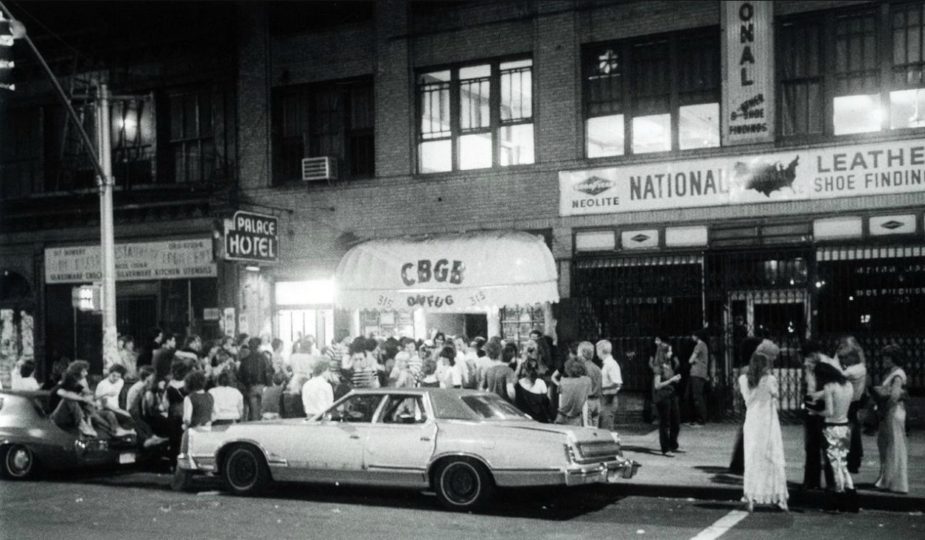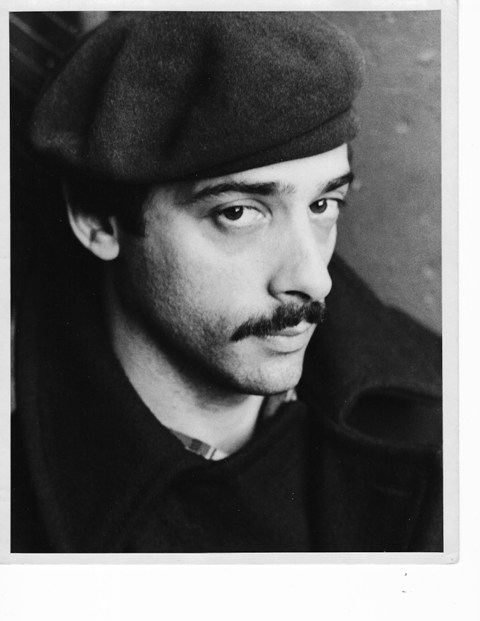
Fate: Five Stories- I. Baked Ziti (the Debbie Harry Story)
I had come to the big city to serve an apprenticeship in life – and fill the void of experience I lacked- so that I might have something to write about. I was ready to suffer for my art, but not too much. Little did I know the depths to which I would sink.
My initiation came at gun point soon after I arrived. Afterwards, I took to strapping a Jim Bowie knife to my hip, and picking my teeth with it whenever I felt someone showing an unhealthy interest in my wallet.
A sign of the times: David Berkowitz, infamous as “Son of Sam,” the Satanist serial killer, was being held at Kings County Mental Hospital, in the Brooklyn hinterland, where he was undergoing evaluation. I happened to be waiting for an elevator to take me to my therapist on the third floor when the doors opened and there he was, in handcuffs and blue hospital gown, open at the back, being escorted by an attendant and a cop, to another part of the hospital. Our eyes clicked for a moment before I forced myself to look away. Was I wrong to think he looked normal?
It was the 70s and British punk had arrived. Sid and Nancy were holding court at the Hotel Chelsea – a veritable bazaar for druggies and posers. In Room 100, the star-crossed lovers would self-immolate in a haze of heroin and punk rocker angst. Months later when I was homeless, a pal on the front desk let me crash there, in their very same room. I looked, trust me, but could find no lingering tang of death.
Only blocks away on 28th, between the Avenue of the Americas and Broadway, a bleach-blonde from Jersey named Deborah Harry could be seen performing in a neighborhood bar, “Beau’s,” in Tin Pan Alley, rocking from table tops rigged as a makeshift stage. Meanwhile, working-stiffs from the flower district quaffed their boilermakers, rubbing elbows with Debbie’s East Village crowd, drag queens and diamond-studded dogs and their concubines. Debbie had yet to meet Chris Stein and find her apotheosis as “Blondie.”
And I, an earnest twenty-something with literary aspirations and a yet-to-be discovered taste for the dark side – for Jezebel’s in black mesh tops, torn tights and vinyl minis, Medusa hair glistening, swaying to the hypnotic thunder of Johnny Thunder’s heroin music in the after hour clubs I was drawn to – I was just finding out just what tricks fate had in store for me.
Having impulsively severed ties with my parents to test my mettle, I arrived in New York with $50 in my pocket and a suitcase of manuscripts I was convinced would be my ticket to fame and fortune. My ride, a tatty, two-tone turquoise, ’67 Cadillac coupe de Ville inherited from dad, served as my sleeping quarters for the first month. Every night after spending the day sucking up local color – notebook in hand, tramping up and downtown, from the Village to Hell’s Kitchen – I parked on 27th St. around the corner from the Armory on Lexington. Hunkered down under a blanket in the backseat, snug against the fall weather, I went unnoticed by police cruisers circling the Armory until dawn. By November it was too cold for comfort, so I sold the Caddy to a Lebanese leather goods importer on Broadway, whom I met at “Beau’s,” where Ms. Harry occasionally appeared.
With the money from the Caddy’s sale, I rented a room at a fleabag SRO hotel, the Latham, a few blocks west on 28th, and took my meals – one-a-day was all I could afford – at the café. While I sucked the nutrition out of the hearty blue plate specials at Beau’s, politely begging extra bread to stuff in my pockets for later, I surveyed the spread of glossy black and white photos of performers adorning the walls. Nights, after the flower district closed down, the café doubled as a showcase for talent. Except for Ms. Harry, none of the acts were known to me.
It was the era of garage bands and punk venues like CBGB’s and Max’s Kansas City, and the writer-in-me was amused by one of the posters announcing the appearance of “the Nothings, the Nobodies, and the Nowheres.” Applauding the promoter’s literary sense of humor in making a bill of alliterated band names touting nihilism, I wondered if it had been accidental. Meanwhile, Ms. Harry seductively stared at me from her glossies, a punk Lorelei luring me onto her rock’n roll altar.
By the time she appeared at the café again, I admit that I was a little in love with her. I happened to be having dinner when she breezed in one afternoon to do a sound-check for the evening’s showcase. From my perch in the dining room, I watched her enfold Beau, the ordinarily-impersonal owner, in her web of feminine charm, reaching up to pull him into her creamy décolletage redolent with civet and patchouli, much to his blustery embarrassment. While her surly Mohawk-haired roadies hauled in the band’s equipment, Beau led her to a table in the dining room near mine, pulled out a chair for her, and cavalierly seated her.
They spoke too softly for me to hear what they were saying, but from Beau’s high color I could tell that she made him pleasurably uncomfortable. Her imago as Blondie was yet to come, but she already displayed the cool sexual allure that would become her trademark. Beau, an avuncular devotee, was under her spell.
He waved over a waitress just as she was going off duty – the lunch crowd having gone back to work – and she impatiently recited the specials for Ms. Harry. Beau excused himself to glad-hand one of his cronies at the door, a mustachio-Pete old timer everyone called “Nate the Skate,” who I had come to suspect of running the numbers racket on the floor above. Ms. Harry, unable to choose among the specials, leaned across the aisle to me, and in a breathy voice asked me what I was having and if it was any good.
“Baked ziti,” I stammered, trying not to appear flummoxed, though it was clear from her coy smile that she knew I was. “It’s not bad,” I said, recovering.
“I don’t bite, y’know,” she said, flashing me her pearly whites.
“Though, on second thought, maybe I will,” she lion-leered in her best Joisey accent, claws drawn, lips curled, fangs exposed.
That got us both laughing. Reaching across the aisle she held out her hand for me to shake.
“Deborah, Deborah Harry.”
No shit! I told myself. Infused with a reckless grace I hadn’t known I possessed, I rose and made a theatrical bow and brushed her hand with my lips. She didn’t stop me; rather, it seemed to me she accepted it as homage.
“Henry, Henry Miller,” I lied, taking in vain the name of one of my literary heroes.
“Right, and I’m ‘Mona’ June Smith,” she said, laughing at her informed allusion to Miller’s wife and paramour, the inspiration for his million word fictive panegyric, The Rosy Crucifixion. “It’s okay, don’t tell me if you don’t want to,” she said, drawing her hand back, all the while keeping eye contact. Hers were jade, I noticed – cool and appraising with a hint of vulnerability.
“Toby – ah, Tobias Moore,” I offered. “Author – from Boston.”
“Me, chanteuse – from Joisey,” Debbie called, pointing to herself. “What have you written, Tobias Moore? Anything I might have heard of?”
“Working on a first novel.”
“Aren’t we all?” she cooed just as Beau arrived, looking me up and down. Though we‘d never spoken, I knew he recognized me as one of the regulars with pinched means – I never ordered more than the special with tap water. Forbearance wearing thin, he waited for me to go back to my Ziti.
After that, Debbie and I became friends, bonding over our mutual admiration for Henry Miller and Anais Nin and the passion that launched their art; she confessed she was looking for a similar liaison, making me hope that I might fulfill that position, as her lyricist, but soon after she took up with Chris Stein, and the rest is history.
We stayed friends even when she became famous in “Blondie.” She liked my proper Bostonian manners and pretentious vocabulary; treating me like a kid-brother, she supported my dreams, grand like hers.
Invited to the recording studio to watch the band lay down the tracks to “Heart of Glass,” I flattered myself thinking that I was the inspiration for the song, about saving Debbie from a stalker. Later, she tried to help my career, introducing me to a flamboyant theatre director from the Village, Anthony Bellarusso, but that backfired when he destroyed my manuscripts out of spite after I refused him sex. Not my cup of tea. But Debbie was. Only two years older than me, she was a punk rock Eve from the burbs, born knowing the ways of the world. Meanwhile, I had yet to experience my down-going, my immersion in the blood of the lamb.


Very jealous of you Gene, if I had a time machine, I’d beam myself right into the 70s New York punk and Studio 54 scene. These are great slices of (your) life, very atmospheric with a hint of doom.
Great story. It´s amazing how you can get introduced inside such an important scene/movement with your own talent. I always thought that it requires a combination of preparation, opportunity, luck and a little malice. I really love Blondie´s “Parallel Lines” album, it´s a new wave gem, just as important as New Order´s “Power, Corruption & Lies”. Looking forward for you next part !.
There is something very special about this period of time. This combination of elegance and decadence that the NY punk scene captured for so many. Rare I say it even has a certain rock n’ roll romance about it? Thank you for sharing your story. Looking forward to the next chapter.
The last sentence kept me intrigued, can’t wait to read more 👍
I enjoyed reading this very much. Back to when New York had the working class in the center of the city, a vitalizing factor. I envy the author for having lived there at this particular time, and meeting Debbie Harry is not bad either…
Felt like I’m right there in 70s New York. What a great read!